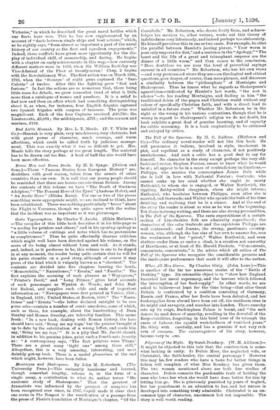When All Men Starve. By Charles Gleig. (John Lane.)—This is
another of the far too numerous stories of the "Battle of Dorking" type. Its ostensible object is to "show how England hazarded her naval supremacy, and the horrors which followed the interruption of her food-supply." In other words, we are asked to believe—at least for the time being—that after Great Britain is confronted by a coalition consisting of Germany, Russia. and France, after her fleets have been defeated, and her food-supplies from abroad have been cut off, the residuum rises in its might and savagery, and marches into London. There anarchy sets up its reign, Buckingham Palace is burnt, and "the mob dances its mad dance of anarchy, revelling in the downfall of the Respectabilities, forgetting in this brief hour of its triumph the curse of Labour, the squalid wretchedness of vanished years." Mr. Gleig writ carefully, and has a genuine if not very rich vein of sarcasm. The extravagances of his story, however, become very te ous.










































 Previous page
Previous page